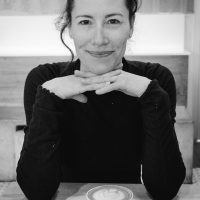Last year I heard a monk speak at the Wanderlust Festival in Whistler.
In contrast to high sweat, uber upbeat, bouncy vinyasa classes that I’d been taking, his talk occurred in a shushed and darkened theatre. He was settled into a chair on stage in his robes, while all of us shifted in our multi-hued Lulu’s, wrung out from our asana.
Someone raised their hand.
“So, being in the moment is great. Right, we know that. But, what about planning,” she said, “moving forward, being productive. I mean, how can we do that if we’re in the moment all the time?”
I perked up out of my post-practice reverie.
I thrived on plans. Planning made me efficient, worthy and good. When I flexed my planning biceps, I could tackle six projects simultaneously, get my car fixed, finish my masters, go for a jog, feed that cat, have sex with my lover and still manage to call my mother.
“Planning?” He said thoughtfully and slowly. “Haven’t you noticed that you may make a plan—but then something far more interesting happens instead? That something is life. And it’s generally far more fun than what we think up.” He nodded, “So yes, fine, good to have a plan. But use it only as a back up. If life doesn’t provide something more interesting first.”
I sat back. No planning?
Oh, no, no, no. How would I get anything done? Without a plan, I would descend into a life of popcorn, bon bon’s and Netflix. I would become inefficient, ineffective, lazy, and unproductive. The Plan was the only thing keeping my squirrelly spirit in line.
Smart monk, I thought. But his words surely didn’t relate to me, or my lofty goals.
Oh, how little I trusted myself.
Over the last year, I have begun to recognize that my dependence on scheduling and planning is hiding a profound fear of who I really am.
My planning habits—filling my calendar months in advance, scheduling friends into narrow windows of time, taking on five massive projects simultaneously—were designed to keep me from a “spiral into chaotic hell” that would surely ensue if I actually did what I wanted, when I wanted to do it.
My plans ensured the hatches were battened down, deadlines were met and goals were accomplished.
My planning hid a dirty truth—secretly I believed at my core—I was a lazy, incompetent slacker who would disintegrate into apathy if the reins were loosened.
As I’ve begun to slowly chip away at my planning compulsions, I have begun the process of discovering who I am when there’s no agenda. What happens when there is open space? Can I trust myself to “be good”—even when it’s not scheduled in my calendar?
In the process, I’ve discovered another problem with my planning.
When I have a plan, everything that I do and experience becomes filtered through The Plan. Does this event/ experience/ person serve The Plan? Then it has a place in my life.
Does it serve The Plan? Nope—discard it! Or more typically, I don’t even notice it because I have filtered it out.
Having a plan can put blinders on our experience.
When the plan is all there is (no matter how simple, complex or awesome the objective), we only see what relates to our desire. And—unless it’s a fire truck—we miss everything else. There’s no room for change, mystery or surprise.
We live in a world that loves planning: “productivity” and “efficiency” are praised far and wide.
But we miss some of the juiciness and whimsy of life.
As I’ve begun to let go of planning, I can feel more openness to possibility. By dropping our own agenda, we can begin to see what is there, not just what serves our immediate priorities. By becoming more open and aware, something shifts internally, where we become part of the world, rather than the world being an object to serve our needs.
In our relationships, our partners and friends can often become an unbidden part of The Plan. Do I want a baby? Do I need security? Am I scared financially? Do I need comfort? A favor? Our loved ones can become puppets in our own personal show.
When our agenda runs the conversation, there is no room to really listen to what they are saying, or to understand their experience. We’re too busy waiting for our own turn to speak.
What if we could drop some of our relentless planning? Let’s meet our lover without an agenda, call our mom without needing anything other but to hear her voice. In the space that opens, who knows what new discoveries may come.
~
Relephant read:
A Perfect Stranger. {Poem}
Author: Rachel Scott
Editor: Ashleigh Hitchcock
Photo: flickr











Read 0 comments and reply